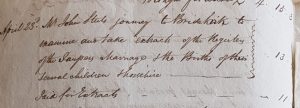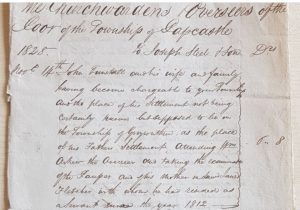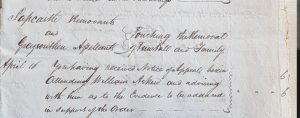In 1828 William Nichol of Bothel brought an action against John Tunstall claiming the horses he had were not his. They were seized despite his attempts to stop it. As a consequence, Tunstall must have felt he would struggle to make a living and applied to William Askew, a bleacher by trade living in the village of Goat and overseer of Papcastle, for relief. Askew suspecting that Tunstall’s place of settlement lay elsewhere and faced with the prospect of a large family needing relief, sought their removal to Greysouthern where he thought their place of settlement might be. The services of Joseph Steele and Son, attorneys of Cockermouth, were employed to investigate. This is just one example of the cases taken on by Steeles for the parish of Papcastle and demonstrates the lengths they went to to determine the facts.[1]
In 1828 John Tunstall and wife, Ann Fletcher, were living in Papcastle just outside Cockermouth. A considerable number of their children were all baptized in the Parish of Papcastle. They were: John (1811), Thomas (1812), James (1814), Fletcher (1816), Jane (1817), twins Sarah (1821) and Mary (1821), Ann (1823), Martha (1824), William (1826) and Joseph (1828). With the exception of one, William who died in 1823 aged three, all went on to live into adulthood.[2]

John Tunstall’s grandfather James Tunstall (1742-1820) had inherited his father’s Moses’ (1700-1757) farm and pottery named Fox House, at Broughton in 1757. Moses was born in Burslem, Staffordshire, and married Sarah Jackson in Duffield, Derbyshire, the place of her birth in 1730. They moved north helping establish some of the potteries of West Cumberland. Moses’ aunt, Margaret Tunstall (1678-1748) and her husband Aaron Wedgewood (1671-1746) of the Wedgwood pottery family of Stoke had already moved from Staffordshire, starting a pottery at Harker Marsh near Dearham at the beginning of the eighteenth century.[3] However, John Tunstall didn’t venture into the pottery trade of his forebears.
The Tunstall case at the Easter Assizes 1829 was described in two local newspapers. The removal order issued was challenged by the parish of Greysouthern.

SPC110/1/3/2/5 8
The following is a summary of events from the evidence given. John Tunstall’s challenge was to prove Papcastle as his place of settlement.
Tunstall was baptized in the parish of Bridekirk on14 December 1788. Papcastle was a township of Bridekirk. His father Thomas Tunstall (1768-1840) was born in Great Broughton. He married his first wife Sarah Johnstone on 15 July 1788 at Dearham. She died on 20 November 1801 and in 1803 he moved to Greysouthern where he rented a property for over £40 a year, therefore gaining a settlement there. In 1804 he married Jane Walker, a widow. Tunstall worked in the local coal mines. Tunstall got into difficulties around 1808 and subsequently his son, John, managed his property while he was in Carlisle Goal.
John Tunstall then moved to Papcastle to work for Thomas Fletcher, and married his granddaughter Ann Fletcher in June 1810. When Thomas Fletcher died the main beneficiary in his will was his daughter Jenny Fletcher, Ann’s mother. The Tunstall family and Jenny lived together. John Tunstall supported his family by taking on a variety of work. Reliant on a horse and cart, he also used to lead wood ( convey wood) for Jenny, . Although her father is described as a yeoman in his will Thomas Fletcher may have diversified into wood leading. Following a difference of opinion and Tunstall claimed he went to rent a property of his own.

SPC110/1/3/2/5 8 April 1829
There are many contradictions in the depositions taken from various people and confusion about who leased what from whom. The voucher lists the detailed expenses incurred by Steele’s to determine the truth.
Among those examined were Richard Blackburn and William Atkinson, present when the property belonging to John Pooley was let. Pooley, stated he would never let property to Tunstall as he was a servant to Jenny Fletcher. William Twentyman, who leased all of Pooley’s property for three years, subsequently sublet parcels to others. In the interim, Twentyman died, so it fell to his son Robert to be questioned about the letting arrangements. Robert said he couldn’t remember events. William Dean of Keswick who had said he paid rent to Jenny Fletcher for Tunstall for one of the properties had also died in January 1829. His wife, Mary, was asked to travel from Keswick to Carlisle to give evidence.
Various family members were called upon including Jenny Fletcher, Thomas Tunstall, his father, John Tunstall his uncle resident at Fox House Farm and Pottery and joint lease holder of the Glass House Pottery, Ginns, Whitehaven, Martha Fletcher (Barton), his sister in law and Jenny Fletcher’s youngest daughter born in 1796; and others.
The dictum was that John Tunstall had not legally held any property. The result was that Tunstall’s settlement was that of his father’s a few miles away at Greysouthern and the Removal Order was upheld. [4]
In subsequent years John Tunstall continued to live and work around the area. His wife Ann (baptized in the parish of Papcastle, 11 March 1785) died in 1856. John then went to live with his son Thomas in Appleby. Both stated their occupation as carter in 1861. John died around 1864.[ 5]
Jenny Fletcher remained in Papcastle. With members of John’s family around her in 1841 she was living with John’s son Thomas and his wife Martha (Spark) and their two children. Next door was Mary (Miller) wife of John’s son James and two children. Mary had been recently widowed, as James had been killed in a waggoning accident in May 1841. [6]
William Askew, married to Eleanor Blackstock, had three sons: Robinson, William and Henry. All three predeceased him. In later life he moved into Cockermouth. His obituary in 1864 suggested he had become quite wealthy. His estate valued around £5000. [7]
Joseph Steele was born in the port town of Whitehaven in 1758. He moved to Cockermouth where he became an apprentice attorney with John Wordsworth, the father of the poet William Wordsworth. By 1785 he had married Dorothy Ponsonby and they went on to have six sons and one daughter, Dorothy. His wife died in 1799 and Steele remarried in 1804. With his second wife, Mary Hodgson, he had a further four sons. His fourth son, Miles, become an attorney in London but died in Nice, France, in 1827.[8] His eldest son John joined his father’s business and worked on the Tunstall case. Joseph Steele died 27 February 1844, two days after his second wife.[9] The business in Cockermouth continued in the hands of John and Edward Bowe Steele a son from his second marriage[10] until John became MP for Cockermouth in 1854.
Steele and Sons main bill came to £30 14s 1d in September 1829. With hindsight it perhaps doesn’t seem to have been the financially prudent thing to do to issue the removal order, but looking to the future the parish of Papcastle may have feared the burden of the Tunstall family should they not be able to support themselves in the future. However, the Tunstalls, according to subsequent census returns did support themselves except son John who periodically received parochial relief.
[1] Cumbria Archives, Papcastle Overseers’ Voucher, SPC110/1/3/2/5 8, Nov. 1828 to April 1829
[2] England, Births and Christenings, 1538-1975 [accessed at www.ancestry.co.uk, 2 April 2021]
[3] Sibson Florence, The History of the West Cumberland Potteries, Volume II, (Distington: Cope Publishing, 2008).
[4] Carlisle Patriot, 2 May 1829, p.2; col. d,e.; Cumberland Pacquet and Whitehaven Ware’s Advertiser 5 May 1829, p. 3 col. a; Wake Henry Thomas, 1878 , All the Monumental Inscriptions in Bringham and Bridekirk 1666-1876 at www.books.google.co.uk Cumbria Archives, PROB/1812/W543, Will of Thomas Fletcher.
[5] General Record Office, Search Index www.gro.gov.uk
[6] 1841 Census HO107; Piece: 161; Book: 7; Civil Parish: Cammerton; County: Cumberland; Enumeration District: 14; Folio: 14; Page: 22; Line: 5; GSU roll: 241278
[7] Whitehaven News, 8 December 1864, p. 5, col, d; Principal Probate Registry. Calendar of the Grants of Probate and Letters of Administration made in the Probate Registries of the High Court of Justice in England. London, England [accessed at www.ancestry.co.uk, 14 April 2021]
[8] Carlisle Patriot, 10 March 1827 p. 2, col. a
[9] Carlisle Journal, 2 March 1844 p. 2, col. g
[10] Slater’s Directory (1848), p. 26.
footnote
The principal people have been named from the bill only as it is length.
Thomas Fletcher’s signed his Will made in 1809 with his mark. Having considerable property in the Papcastle area most of those who were to receive a legacy were his family. It being stipulated how each dwelling was to be allocated most of their names are prefixed by reputed. For example his reputed wife Jane, his reputed daughter Jenny Fletcher , grandson Thomas son of his reputed son Thomas Fletcher of Cockermouth, and his reputed great grandson Thomas Fletcher natural son of Ann Fletcher who was the natural daughter of his reputed daughter Jenny Fletcher. Jenny Fletcher’s other two daughter’s Martha (Barton) and her twin Mary were to receive twenty pounds.